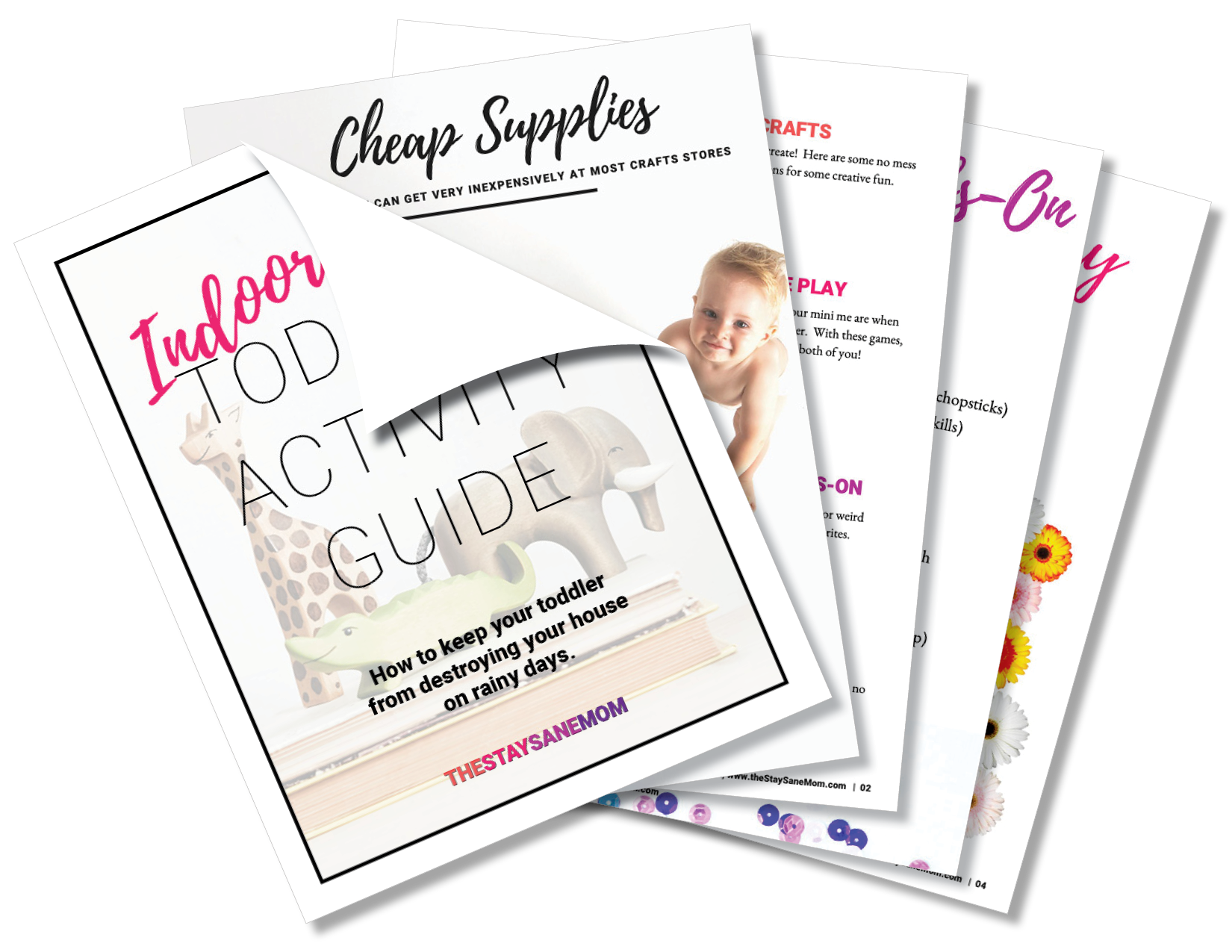How to Parent Towards a Balanced Childhood

How to Parent Towards a Balanced Childhood
Every parent wants their child to succeed, but it’s hard to know how to help them without interfering too much in their personal development and their quest for independence. Here's a list of tips to help you strike the right balance
Written by Liz Bayardelle, PhD | See Comments | Updated 08/29/2019
Want to cut to the chase?
Indoor Activities for Toddlers Guide

Want to cut to the chase?
Indoor Activities for Toddlers Guide
Get the Free Printable eBook Now
Get it NowHow to Parent Towards a Balanced Childhood
This post contains some affiliate links for your convenience. Click here to read my full disclosure policy.
There is no definitive guide for parenting.
You know this. (Plus, if it was possible to try to encapsulate the complexities of parenting in spreadsheet format you know I’d have tried by now.)
All children are different and all parents are different. That being said, certain parenting experiences are universal, and that means there are a few universal pieces of advice you could take on board.
Every parent wants their child to succeed, but it’s hard to know how to help them without interfering too much in their personal development and their quest for independence. So, with that in mind, here are a few helpful suggestions that might help your child to get the most out of life.
#1: Encourage Them to Try New Things
If you want to help your child grow without excessively interfering in their life, then you should encourage them to try new things. That way, you can help them to try to find friends and perhaps even new hobbies. You’ll be supporting them, but you’ll be doing so in a way that allows them to find their own passions.
Obviously, they’re not grown-ups who are ready to leave home just yet, but children need some semblance of independence in order to grow and learn about the world. It’ll keep them happy in the present day, but it’ll also help them to be strong and confident in the future.
Since my toddler has been old enough to participate in James, we've been throwing her at every extracurricular opportunity we can. She's tried out ice skating, gymnastics, dance classes, sign language, and pretty much anything else we can find in our community.
No, she has not continue to do all of these things all the time, but that's okay. In fact, it's good. Kids should know they can try things out, absolutely suck at them, have a grand time even while they are horrible at something, and move on if they find out it's not their cup of tea.
It's very dangerous to teach kids that they can only try things they plan to master and become world champion Zack, because it teaches them that they can try things just for fun and they shouldn't be bad things. This makes your kids tentative and hesitant, which no one wants.
You might want to look into winter swim lessons for kids. An activity such as swimming is great because it’ll be an opportunity for your child to stay physically active but also to make friends. Plus, swimming is a fun sport; kids love splashing around in pools. Of course, it helps to talk to your child, too.
Figure out what they enjoy in life.
If they show an interest in music, then you might want to buy a keyboard or some other instrument for them to learn. That would be a good way to encourage them to try new things. You’re not saying they have to attend music school; you’re just giving them the opportunity to try something which might become a proper hobby. Just remember to praise success and failure.
Your kid isn’t always going to get things right, but they need to learn that failure is fine. Otherwise, they’ll struggle to deal with it in later life.
#2: Encourage Them to Stick With Some Things
While it's important to let your kids try out new stuff risk-free, it's also important that they learn to stick with things as well.
You don't want to create a bunch of hedonistic opportunity hoppers who quit the second something gets hard and never stick with anything.
In our house, each of our kids has two have one thing with their doing long-term. They can try out whatever they want on top of this, but they still have one thing that they've been doing for at least a year. For our oldest, She has been doing piano lessons since 4th grade. The time commitment here is pretty manageable as she only practices 15 minutes a day and has a once-a-week lesson. However, she gets the psychological growth that comes with having done something for half a decade, as well as the added boost on her college applications when the time comes to show that she can stick with something.
As long as your kid is engaged in one long-term activity, you can feel free to let them try out new things with their other spare time. And they want to quit their long-term activity, they should have built up another one (to the “I’ve been doing this for at least a year” threshold) before they are allowed to quit their other “thing”.
#3: Stress the Long-Term Importance and Benefits of Academics
It’s a given that you should support them academically.
Obviously, you already do that, but you need to keep up with what they do. Depending on the age of your kiddos, schoolwork necessitates a different level of vigilance. With early elementary schoolers you might want to sit down and work through it with them, but by high school we’re down to a 10-minute “business meetings” every night so they can show us everything they completed on their own and ask any questions they have.
However, if you limit your academic vigilance to asking ‘is your homework done’, you’re going to miss out on a huge opportunity.
Pay attention to their strengths and weaknesses. Encourage them to pursue topics that come easily to them. If they’re numerically-gifted, for instance, then that’s a skill they should hone for later life. If they like art, take them to museums, classes, or the local paint store. Whatever they show a natural proclivity for, encourage it. Make it fun.
It's so much more important that you encourage them in whatever stupid thing they're currently interested in and give them the feeling of accomplishment and succeeding at something and then funneling them into whatever academically and you think is going to make the most successful later in life. The most important skills they need right now are creativity, curiosity, and motivation.
It doesn't matter if they think they want to go to clown school. Lean into it and they will learn to channel that energy in more employable directions as they get older.
#4: Don’t Stress Formal Academics Too Much
I'm not ever going to tell you the grades aren't important, because I am the biggest Hermione on the planet when it comes to having a visceral fear of the A-.
What I am saying is that if you stress the outcome of good grades too much, your kid will miss out on developing a love of learning. If you encourage them to love learning, develop enjoyment and curiosity, and foster wanting to know the answer (regardless of the outcome) good grades will take care of themselves.
If you only care about the grade, they’ll forget what they learned five minutes after they walk out of the final exam. If you cultivate a love of learning, they might actually be that 40-something that still remembers and uses their high school Spanish.
#5: Don’t Neglect Your Own Needs
If you want to be a strong and supportive parent, then you have to remember to look after yourself.
No one can be a patient mom without some level of self-maintenance.
(I hate the term self-care because it sounds like you’re about to hit the spa. Self-maintenance is the maternal equivalent of making sure your car doesn’t break down so you can actually drive your kids places. It’s necessary to keep yourself up-and-running because you need to be that way for your kids. Self-care can be optional, but self-maintenance is mandatory. Thank you for coming to my TED talk.)
You can’t be the super-parent that your child needs on a 24/7 basis - you have to stop and take a break from time to time so you can recharge your batteries. That way, you can be the super-parent your kid needs.
But when you’re feeling depleted and you’re running out patience, energy, or will to make it until bedtime (which is still an unholy 3 hours 52 minutes away), that’s when it’s time to call a friend, your local babysitter, your spouse, or even unleash an extra “bonus hour” of screen time to take a little bit of the pressure off.
If you want to help your child to get the most out of life, then you have to treat yourself well. That’s how you’ll be the best possible parent.
The Big Picture
You'll notice a lot of these things came in pairs consisting of opposite pieces of advice. this is intentional. This is because life needs balance. If you go to hardcore in any One Direction, probably going to create a less than happy environment for your family.
Parenting, like dieting, exercise, and so many other seemingly impossible tasks in life embodies the saying “everything in moderation, including moderation”. try to create balance. Try to be rational. But don't stress too hard if you go over the top every once in awhile.
As long as your heart is in it and your intentions are in the right place you're going to turn out fantastic kids. I promise.
Start Your Next Step
Indoor Activities for Toddlers Guide

Start Your Next Step
Indoor Activities for Toddlers Guide
Get the Free Printable eBook Now
Get it NowGet Sanity, Delivered to Your Inbox.
Care to Share?
About the Author

Liz Bayardelle, PhD
Founder | Contributor
Liz (or Dr. Mommy, as her toddler started calling her after learning what a PhD was) is the happily sleep-deprived mom of a toddler (and professional raccoon noise impersonator), a sparkle-clad kidnado, a teenage stepdaughter, 200 cumulative pounds of dog, and herd of dustbunnies (if daily vacuuming doesn't occur). During nights and naptimes, she uses her PhD in business psychology as an author, speaker, and consultant. She also serves as an executive and principal for three companies, two of which she co-founded with her very patient (and equally exhausted) husband.





-Budget.jpg)